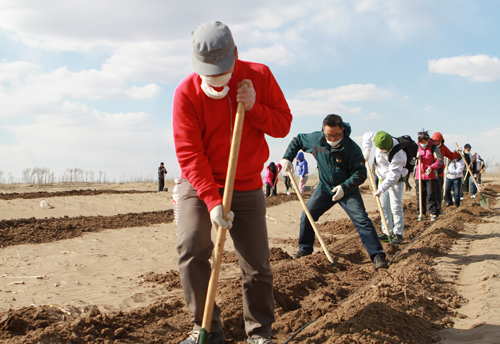100 Stories2012 Tree Planting in Desertified Areas of Inner Mongolia
We engaged in “Tree planting in the nearest desertified area to Japan.”
Under this a slogan, Asahi Kasei planted trees in the Horqin Desert in Inner Mongolia from 2012 to 2017 in cooperation with the Yicai Media Group, a major Chinese media company, to halt the progress of desertification.
The Horqin Desert is the closest desertified area to Japan, and is located in the southeastern part of China's Inner Mongolia Autonomous Region. Until a few decades ago, the land was rich in forests and grasslands, but excessive cultivation, grazing, and logging have led to desertification. Before that, the area was originally a grassland, which means that groundwater was abundant and fruit trees, vegetables, and rice paddies could be grown in this area.
In response to the desertification of the Horqin Desert, this activity is part of the “Trees are Waiting” public benefit project that Yicai Media Group and Asahi Kasei have been implementing since 2011. Members of the Asahi Kasei Group in Japan and China planted several thousand trees every year.
In 2013, eight Asahi Kasei Group employees in China participated in the project, digging holes in the desert and planting poplar saplings, which are resistant to drought, in harsh weather with strong winds and blowing dust.
A Chinese staff member who participated in the project recalled how keenly he felt the harshness of nature in Inner Mongolia: “In my imagination, the Horqin Desert was an endless stretch of prairie, but in reality, I realized that it was just an expanse of rough sand that covered my face when the wind blew.
Nature is telling us about the effects of our excessive human greed on the environment. I also felt that we can make our living environment beautiful and wonderful by doing our best, one person at a time, in a small way.”
While facing the harsh reality of the situation, he also felt a sense of hope that nature lost by human hands can be regained by human hands. Participation in this activity and realizing the reality of the situation changed his awareness.
Another Chinese staff member said, “For the first time, I recognized that the tree planting project is a long-lasting project. The life span of a poplar tree is 15 to 20 years, so the planting of trees is not the end of the project, as they need to be re-planted after 15 years. It is also a lot of work to manage the trees, including pruning and pest control. Furthermore, it is not economically feasible, so it is generally difficult to undertake as a business. That is why I feel that our donations and activities are doing a lot of good.”
This activity ended in 2017. The number of participants increased every year, to the point where a lottery needed to be held to decide participants. The activity provided an opportunity to encourage employees to act voluntarily to address environmental issues and to recognize that a company is a public institution of society in order to develop business in China.
 Tree planting in 2013
Tree planting in 2013

